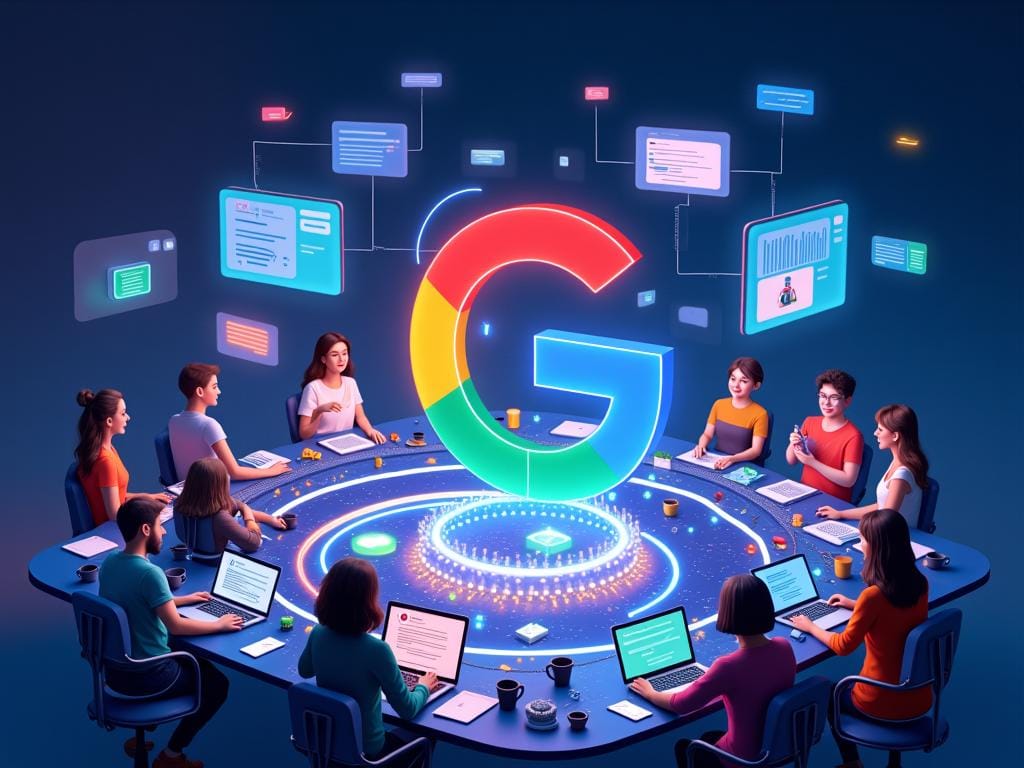A Win-Win Deal for Google and Bloggers?
This blog post outlines a proposed business model by OpenAI to ensure fair compensation for bloggers when their content is used by Google AI. The model emphasizes enhanced attribution, revenue sharing, opt-in participation, and licensing agreements. By fostering collaboration, it aims to balance ...

This is an excerpt from the business model proposed by OpenAI o1-preview to fairly compensate Bloggers when their content is used by Google AI.
Here is the original Post:
https://airabbit.blog/a-viable-win-win-deal-with-google-and-bloggers/
If you prefer an interactive version, have a look at this:


<CITATION>
Based on the facts provided, it's clear that the introduction of Google's AI Overviews has the potential to significantly impact the visibility and traffic of small publishers and bloggers. To create a mutually beneficial business model, we need to address the concerns of publishers while aligning with Google's objectives.
1. Enhanced Attribution and Prominent Linking
- Clear Source Identification: AI Overviews should prominently display the sources of the summarized content, including the publisher's name and logo.
- Direct Links: Include direct, noticeable links to the original articles within the AI Overviews, encouraging users to click through for more detailed information.
- Multiple Source Links: If the AI Overview synthesizes information from multiple sources, provide individual links to each, giving credit to all contributing publishers.
Benefit: This increases the likelihood of users visiting the publishers' websites, maintaining or even enhancing traffic levels.
2. Revenue Sharing Model
- Ad Revenue Sharing: Implement a system where a portion of the ad revenue generated from pages displaying AI Overviews is shared with the publishers whose content is utilized.
- Transparency in Metrics: Provide publishers with access to metrics related to how their content is used in AI Overviews, including impressions and click-through rates.
- Fair Compensation Framework: Develop a standardized compensation model based on the extent of content usage and the traffic generated.
Benefit: Publishers receive financial compensation for their content, offsetting potential losses from reduced direct traffic.
3. Opt-In Participation with Customization Options
- Voluntary Inclusion: Allow publishers to opt-in to having their content included in AI Overviews.
- Content Control: Provide tools for publishers to specify how their content is summarized or to highlight specific articles.
- Feedback Mechanism: Establish a system where publishers can report inaccuracies in AI Overviews related to their content for prompt correction.
Benefit: Publishers maintain control over their content and how it's presented, ensuring accuracy and aligning with their brand image.
4. Collaborative Content Development
- Joint Content Initiatives: Google can collaborate with publishers to create AI-friendly content optimized for summarization.
- Training and Resources: Offer training sessions and resources to help small publishers and bloggers understand how to create content that performs well with AI Overviews.
- Innovation Grants: Provide grants or funding for publishers to develop innovative content formats compatible with AI frameworks.
Benefit: Empowers publishers to adapt to new technologies and potentially reach wider audiences through optimized content.
5. Specialized Publisher Platforms
- Dedicated Publisher Section: Within search results, include a dedicated section for publisher content, ensuring it remains prominently visible even with AI Overviews.
- Rich Snippets and Previews: Enhance publisher listings with rich snippets, images, and content previews to make them more engaging.
- Personalization: Use user data to personalize content suggestions from publishers, increasing relevance and engagement.
Benefit: Maintains visibility for publisher content, potentially increasing user engagement and click-through rates.
6. Licensing Agreements
- Content Licensing: Establish formal licensing agreements where Google pays publishers for the right to use their content in AI Overviews.
- Negotiated Terms: Scale terms based on publisher size, ensuring fair opportunities for small publishers and bloggers.
- Legal Safeguards: Protect both parties legally, ensuring that content use complies with intellectual property laws.
Benefit: Provides a direct revenue stream for publishers and legal clarity for content usage.
7. Ad Placement Opportunities
- Integrated Ads for Publishers: Allow publishers to place their own ads or sponsored content within AI Overviews.
- Revenue from Ad Placements: Publishers can earn additional income from ads displayed alongside their content summaries.
- Ad Performance Data: Share performance metrics to help publishers optimize their ad strategies.
Benefit: Creates new revenue opportunities for publishers and increases the value of AI Overviews for advertisers.
8. Support for Small Publishers and Bloggers
- Visibility Boost Programs: Offer programs that give small publishers and bloggers increased visibility within search results and AI Overviews.
- Educational Resources: Provide resources to help them understand and leverage AI technologies effectively.
- Community Building: Facilitate forums where small publishers can share best practices and collaborate.
Benefit: Helps small publishers and bloggers compete on a more level playing field, fostering diversity in content.
9. Compliance with Regulatory Standards
- Adherence to Fair Use Policies: Ensure that the use of publisher content in AI Overviews complies with fair use and copyright laws.
- Transparency with Stakeholders: Maintain open communication with publishers regarding how their content is used.
- Ethical AI Practices: Commit to ethical AI practices, including accuracy, accountability, and respect for content creators.
Benefit: Builds trust between Google and publishers, reducing legal risks and fostering a collaborative environment.
Implementation Strategy
- Pilot Programs: Start with pilot programs involving a select group of publishers to refine the model.
- Feedback Loops: Establish continuous feedback mechanisms to address concerns and make adjustments.
- Phased Rollout: Gradually implement the model, allowing time for adaptation and ensuring technical stability.
Benefits to Google
- Enhanced User Experience: Providing accurate, summarized information quickly enhances user satisfaction.
- Content Diversity: Encouraging publisher participation enriches the content ecosystem.
- Regulatory Compliance: Proactively addressing publisher concerns may reduce the risk of legal challenges.
Benefits to Publishers and Bloggers
- Sustained Traffic: Improved visibility and direct links help maintain or increase website traffic.
- Revenue Opportunities: New revenue streams from ad sharing and licensing agreements.
- Adaptation to Future Trends: Collaborating on AI initiatives positions publishers for future success.
Conclusion
By fostering a collaborative relationship, Google, small publishers, and bloggers can create a sustainable ecosystem where AI Overviews enhance the user experience without undermining the viability of content creators. The proposed business model aims to balance technological advancements with the economic and ethical needs of publishers, ensuring mutual growth and success.
</CITATION>




